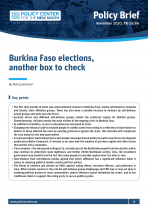Burkina Faso elections, another box to check
• The first nine months of 2020 saw unprecedented violence in Burkina Faso, mostly attributed to al-Qaeda and Islamic State affiliated groups. There has also been a notable increase in violence by self-defense armed groups and state security forces. • Security forces and affiliated self-defense groups remain the preferred targets for jihadist groups. Simultaneously, civilians remain the main victims of the ongoing crisis in Burkina Faso. • In addition to fatalities, access to education has worsened in 2020. • Changing the electoral code to exclude people in conflict zones from voting is a reflection of state failure to deliver to those affected the most by existing grievances against the state. This situation will complicate the task ahead for the new government. • Current president, Roch Kaboré faces well-known and experienced politicians with close ties to his deposed predecessor Blaise Compaoré. It remains to be seen how the memory of previous regime will affect those that led the 2014 revolution. • ‘Force majeure’, the law passed on August 25, excludes part of the Burkinabe people from the election, which government may benefit from the fact that some people in unstable regions won’t be able to vote. • Interviewees from self-defense groups agreed that ethnic affiliation has a significant influence when it comes to choosing political leaders and/or political parties. • The threat of violence and attacks by VEOs against voting offices, elections officials, and politicians is clear. What remains unclear is the role the self-defense groups Koglweogo and VDP may or may not play in enabling political parties to reach communities, and/or influence and/or intimidate the voters, and to use traditional chiefs to support the ruling party to secure political gains.










